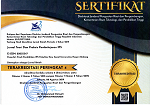Power-curriculum, collective memory, and alternative approaches in learning history
Abstract
This study analyzes the curriculum's influence, collective memory formation, and alternative approaches to learning history. This research was carried out using qualitative methods with a descriptive approach. The data in this study consisted of 3 sources: informants, documents, and learning activities. Data analysis applied Critical Discourse Analysis (CDA). The research findings show that, as a reference document, the curriculum also has a negative impact on teachers, one of which is the perception that the curriculum is a rigid document and inhibits teacher freedom. So that in learning history, collective memory is formed based on official history, which is very difficult for teachers to provide information about alternative history. Teachers must implement alternative learning approaches such as humanism, critical pedagogy, and reflective approaches. To create a more enjoyable learning atmosphere and to accommodate all groups in Indonesia to be involved in discussing the history of their nation, which is humane and free from grudges and hatred.
Keywords
Full Text:
PDFReferences
Ahmad, T. A. (2014). Kendala Guru dalam Internalisasi Nilai Karakter pada Pembelajaran Sejarah. Khazanah Pendidikan, 7(1), 11-25.
Ahmad, T. A. (2016). Sejarah Kontroversial di Indonesia: Perspektif Pendidikan. Yayasan Pustaka Obor Indonesia.
Arraman, B. C., & Hazmi, N. (2018). Analisis Buku Teks Sejarah Kelas X Kurikulum 2013. Kaganga: Jurnal Pendidikan Sejarah dan Riset Sosial-Humaniora, 1(2), 122-140.
Ashby, R. (2017). Understanding Historical Evidence: Teaching and Learning Challenges. In Debates in History Teaching, Second Edition (pp. 144-154). Routledge.
Basri, M., Setiawan, J., Insani, M., Fadli, M. R., Amboro, K., & Kuswono, K. (2022). The Correlation of the Understanding of Indonesian History, Multiculturalism, and Historical Awareness to Students' Nationalistic Attitudes. International Journal of Evaluation and Research in Education, 11(1), 369-376.
Bijl, P. (2012). Colonial Memory and Forgetting in The Netherlands and Indonesia. Journal of Genocide Research, 14(3-4), 441-461.
Cole, L., & Barsalou, J. (2006). United or Divide?. The Challenges of Teaching History in Societies Emerging From Violent Conflict. Washington, DC: United Institute of Peace Special Report, 163.
Creswell, J. W., & Poth, C. N. (2016). Qualitative Inquiry and Research Design: Choosing Among Five Approaches. Sage publications.
Douch, R. (2021). Local History. In Handbook for History Teachers (pp. 75-89). Routledge.
Eldredge, C. B., & Cole, G. W. (2008). Learning From Work with Individuals with a History of Trauma. in Bodies in Treatment: The Unspoken Dimension, (pp. 79-102). The Analytic Press.
Fathoni, B. (2020). Reflective Pedagogy as Humanistic Learning. Historika, 23(1), 79-91.
Galtung, J. (2001). After Violence, Reconstruction, Reconciliation and Resolution. Reconciliation, Justice and Coexistence: Theory and Practice, (pp. 3-23). Lexington Books.
Halbwachs, M. (1992). On Collective Memory. University of Chicago Press.
Halim, F. R. (2013). Fasilitas Eduwisata Sejarah Perjuangan Kota Surabaya. eDimensi Arsitektur Petra, 1(2), 118-124.
Hasan, S. H. (2012). Pendidikan Sejarah untuk Memperkuat Pendidikan Karakter. Paramita: Historical Studies Journal, 22(1), 81-95.
Hasan, S. H. (2019). Pendidikan Sejarah untuk Kehidupan Abad Ke-21. Historia: Jurnal Pendidik dan Penelitia Sejarah, 2(2), 61-72.
Ienaga, S. (1993). The Glorification of War in Japanese Education. International Security, 18(3), 113-133.
Kaufman, S. J. (2001). Modern Hatreds: The Symbolic Politics of Ethnic War. Cornell University Press.
Kochhar, S. (2008). Pembelajaran Sejarah. Terjemahan Purwanta dan Yovita Hardiati. Jakarta: PT. Grasindo.
Kurniawan, G. F. (2020). Problematika Pembelajaran Sejarah dengan Sistem Daring. Diakronika, 20(2), 76-87.
Kurniawan, G. F., Warto, W., & Sutimin, L. (2019). Dominasi Orang-Orang Besar Dalam Sejarah Indonesia: Kritik Politik Historiografi dan Politik Ingatan. Jurnal Sejarah Citra Lekha, 4(1), 36-52.
Magro, G., De Carvalho, J. R., & Marcelino, M. J. (2014). Improving History Learning through Cultural Heritage, Local History and Technology. ERIC.
Mehlinger, H. D. (1985). International Textbook Revision: Examples from the United States. Internationale Schulbuchforschung, (pp. 287-298). JSTOR.
Micale, M. S., & Pols, H. (2021). Traumatic Pasts in Asia: History, Psychiatry, and Trauma From the 1930s to the Present. Berghahn Books.
Olick, J. K. (1999). Collective Memory: The Two Cultures. Sociological Theory, 17(3), 333-348.
Persada, S. S. (2019). Pengembangan Berpikir Historis dalam Buku Teks Pelajaran Sejarah SMA. Candi, 19(2), 1-16.
Podeh, E. (2010). Univocality Within Multivocality: The Israeli-Arab-Palestinian Conflict as Reflected in Israeli History Textbooks, 2000-2010. Journal of Educational Media, Memory, and Society, 2(2), 46-62.
Purwanta, H. (2013). Militer dan Konstruksi Identitas Nasional: Analisis Buku Teks Pelajaran Sejarah SMA Masa Orde Baru. Paramita: Historical Studies Journal, 23(1), 88-102.
Safitri, D. A., & Umamah, N. (2019). Accelerated Learning Integrated by Discovery Learning in History Course: How Z Generation Learn. IOP Conference Series: Earth and Environmental Science,
Setiawan, B., & Suwandi, E. (2022). The Development of Indonesia National Curriculum and Its Changes: The Integrated Science Curriculum Development in Indonesia. Journal of Innovation in Educational and Cultural Research, 3(4), 528-535.
Soh, C. S. (2020). The Comfort Women: Sexual Violence and Postcolonial Memory in Korea And Japan. University of Chicago Press.
Sumaludin, M. M. (2018). Identitas Nasional dalam Buku Teks Pelajaran Sejarah. Historia: Jurnal Pendidik dan Peneliti Sejarah, 1(2), 97-104.
Supardan, D. (2005). History Learning on The Approach Of Multicultural and Local, National, Global History Perspective For National Integration: A Quasi-Experimental Study on Senior High School Student in Bandung City Universitas Pendidikan Indonesia.
Wahyudin, D., & Suwirta, A. (2020). Politics Of Curriculum in The Educational System in Indonesia. TAWARIKH, 11(2), 143-158.
Widodo, S. A. (2010). Metode Hermeneutik dalam Pendidikan. Program Pasca Sarjana UIN Sunan Kalijaga.
Wijayanti, Y. (2017). Peranan Penting Sejarah Lokal dalam Kurikulum di Sekolah Menengah Atas. Jurnal Artefak, 4(1), 53-60.
Wineburg, S., & Reisman, A. (2015). Disciplinary Literacy in History: a Toolkit for Digital Citizenship. Journal of Adolescent & Adult Literacy, 58(8), 636-639.
Wineburg, S. S., Martin, D., & Monte-Sano, C. (2012). Reading Like a Historian: Teaching Literacy in Middle and High School History Classrooms. Teachers College Press.
Yefterson, R. B., Naldi, H., Erniwati, E., Lionar, U., & Syafrina, Y. (2020). The Relevance of Local Historical Events in Building National Identities: Identification in the History Learning Curriculum in Indonesia. International Journal of Progressive Sciences and Technologies, 23(1), 500-504.
DOI: http://dx.doi.org/10.17977/um022v8i12023p8
Refbacks
- There are currently no refbacks.
Editorial and Administration Office:
This Journal is published by Prodi Pendidikan IPS, Fakultas Ilmu Sosial, Universitas Negeri Malang
Semarang St. No. 5 Building I3-102 65145.
Phone. (0341) 551312. line. 376 (19)
Homepage: http://journal2.um.ac.id/index.php/jtppips/index
email: jtp2ips.journal@um.ac.id
JTP2IPS INDEXED BY:
e-ISSN 2503-5347
ISSN 2503-1201
JTP2IPS is licensed by CC BY 4.0.











